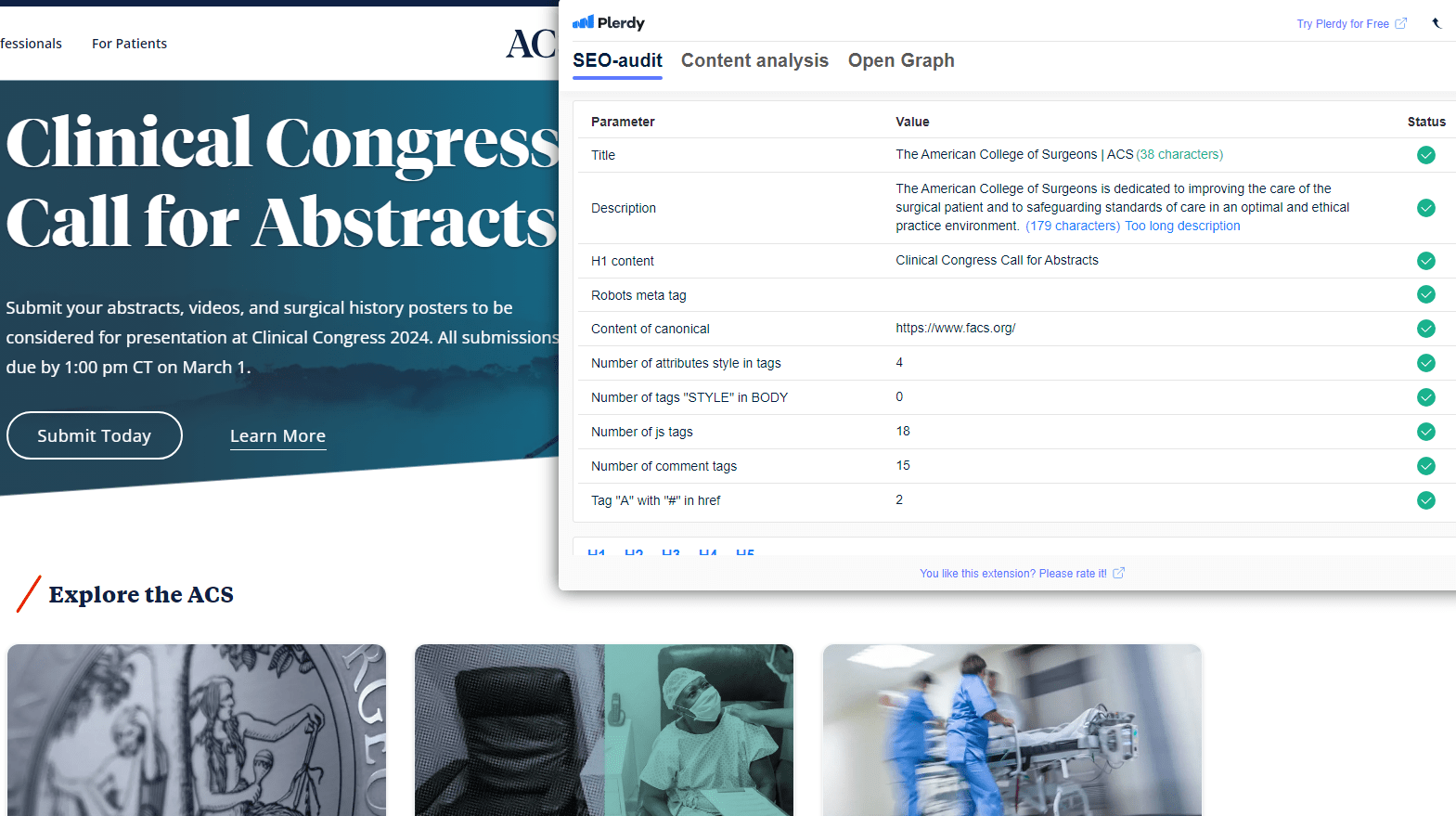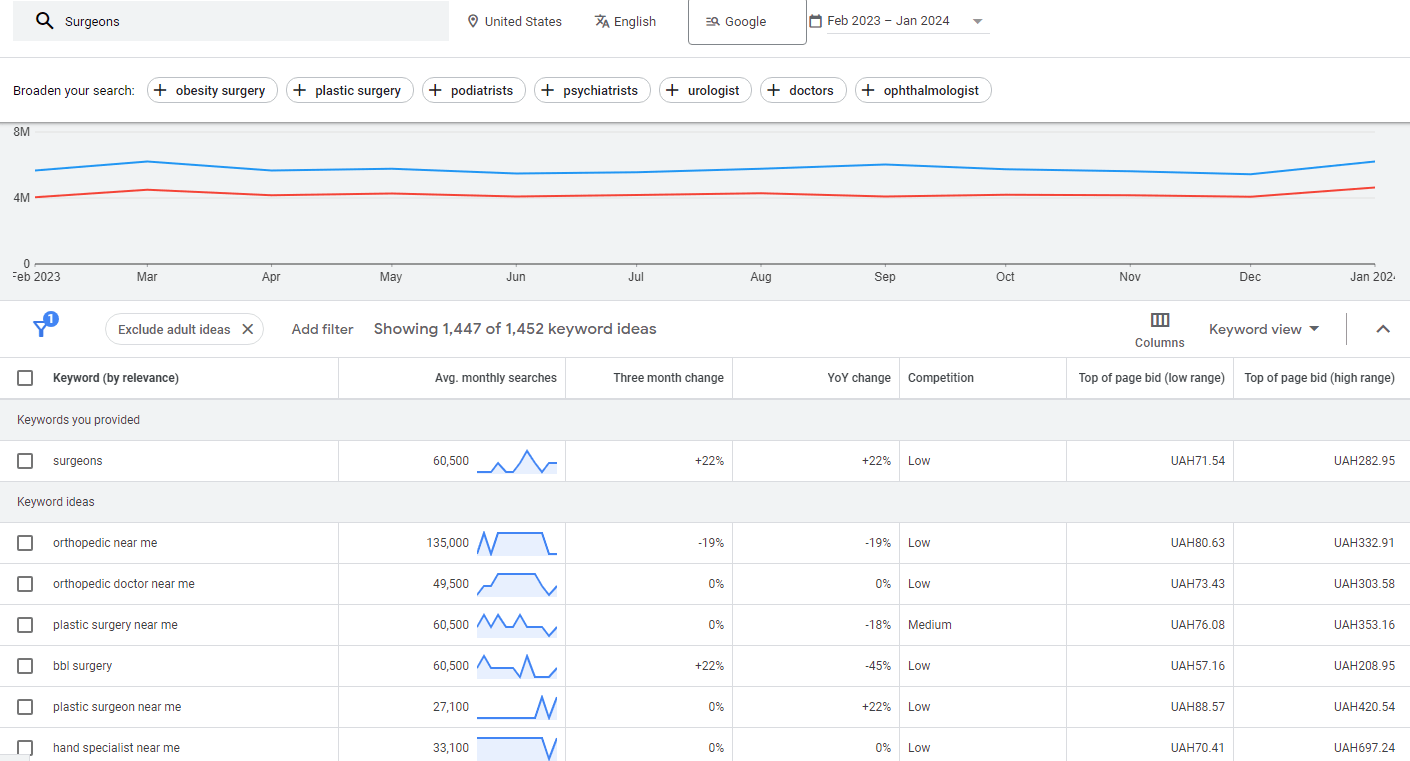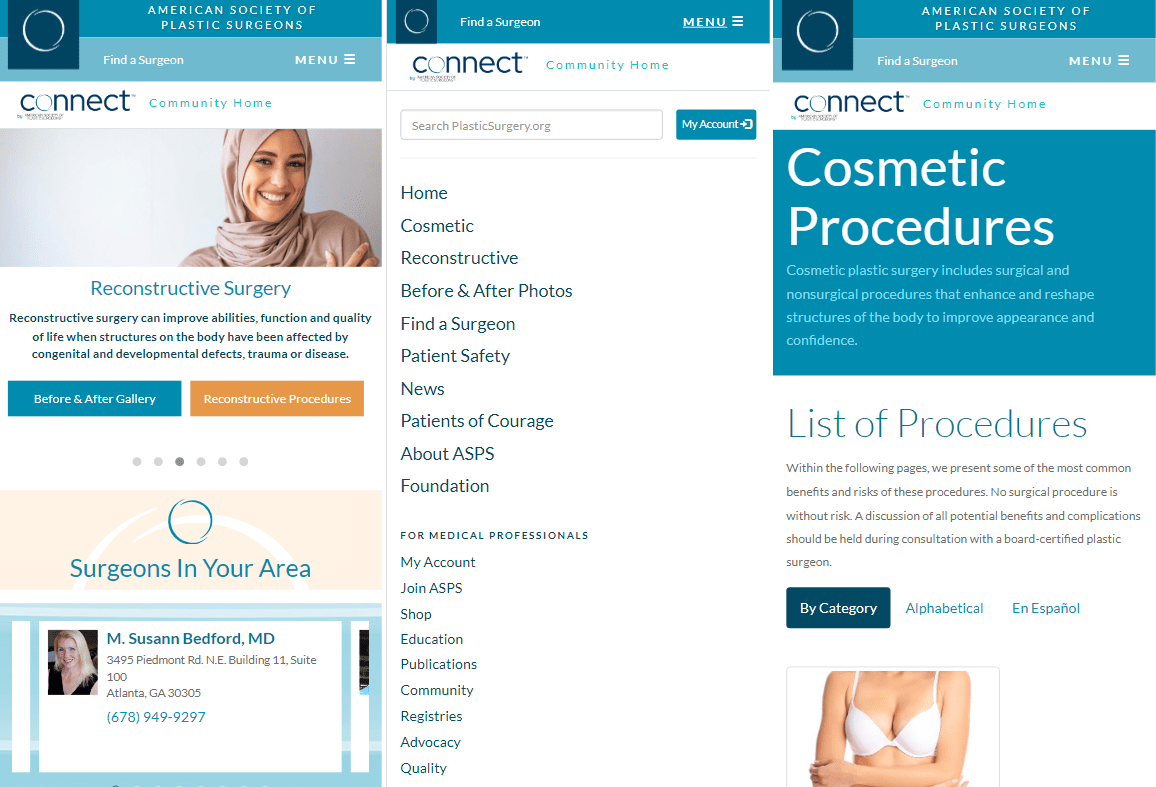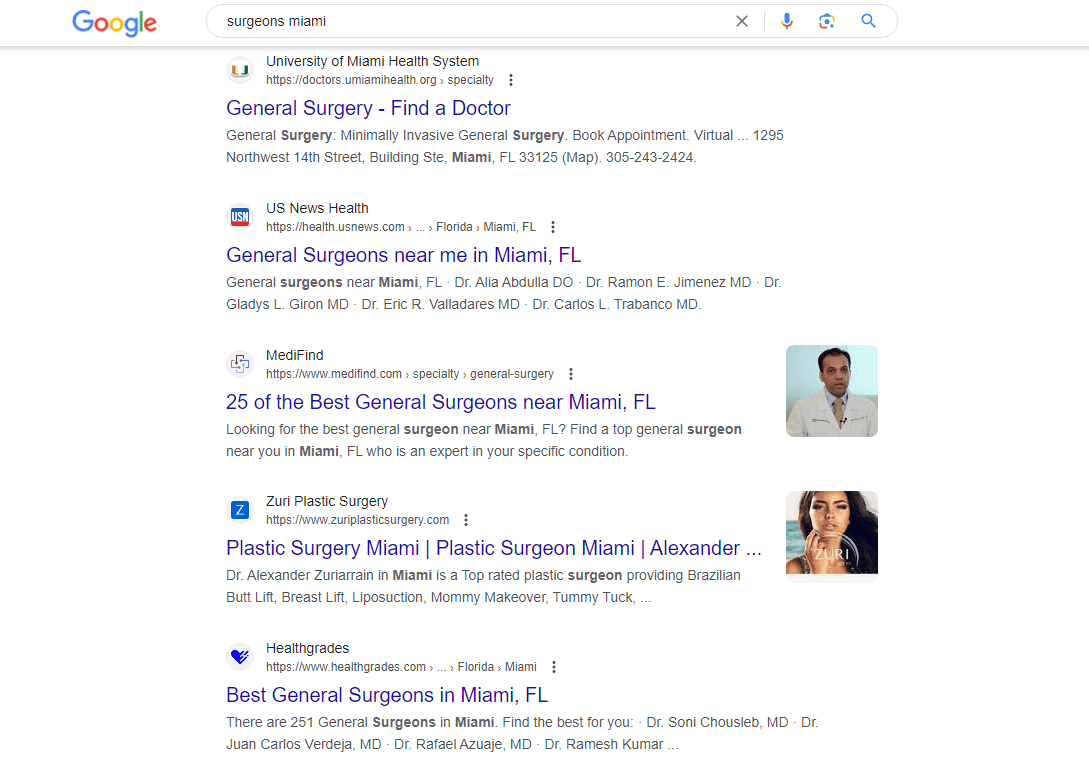In the world of surgery, where precision is key, venturing into the maze of SEO can feel like performing a delicate operation without a scalpel. Welcome to “SEO for Surgeons,” where we stitch together the intricate details of digital marketing to enhance your practice’s online presence. Like you efficiently navigate complex surgeries, this guide will provide the SEO tools you need to cut through the competition and boost your digital presence. Speaking of tools, Plerdy’s analytics and SEO capabilities are like a surgeon’s trusted instruments, providing you with the insights to perform at your best in the online world. Stay tuned as we dissect SEO, making it simple yet impactful for your surgical practice.

Introduction to SEO for Surgical Practices
In a world where the scalpel meets the keyboard, SEO is the key to unlocking your surgical practice’s online potential. Imagine your website as the digital front door to your practice—SEO ensures it’s both visible and inviting to potential patients.
- SEO, or Search Engine Optimization: Improving your website’s search engine rankings. It’s more than just being online; it’s about being found. SEO’s importance is evident when 80% of people search online for their next doctor.
- The Digital Waiting Room: Your online presence is patients’ first interaction with your practice. In the digital realm, first impressions are shaped by how easily potential patients find you. SEO acts as a guiding light, leading them to your virtual doorstep.
- The Connection Bridge: Effective SEO is more than keywords and backlinks; it’s about forging connections. It builds trust and showcases your expertise, making your practice the go-to choice for those in need.
SEO for surgeons is about cutting through the digital noise and ensuring your practice stands out. It’s about being the first choice for patients actively searching for your expertise. The right SEO strategy transforms your website from a mere online presence to a dynamic patient magnet.
For an authoritative perspective on the impact of digital presence, Mayo Clinic’s research provides valuable insights. Embrace SEO as your ally in this digital era, and watch your surgical practice flourish.
Understanding the Basics of SEO

Diving into SEO can feel like learning a new language, but it’s a language worth mastering for your surgical practice. This section peels back the layers of SEO, simplifying its complexities into actionable insights.
- What is SEO? Search Engine Optimization boosts your website’s visibility on Google for services linked to your profession. It’s about making your site more appealing to search engines and potential patients.
- Importance of Keywords: SEO relies on keywords, which patients use to find surgical services online. Identifying the right keywords is like unlocking the door to increased web traffic.
- Understanding SERPs: SERP stands for Search Engine Results Page. It’s where your website appears after a search is made. Your goal is to be at the top of this page, as top positions receive the most clicks.
Understanding the basics of SEO is essential for any modern surgical practice. By grasping what SEO is, the importance of keywords, and the role of SERPs, you’re setting the foundation for a robust online presence.
Remember, SEO is an ongoing journey. With the right approach and continuous effort, your practice will reach new heights in search rankings and patient trust and loyalty. Stay informed, stay ahead, and watch your practice thrive in the digital landscape.
Developing an SEO Strategy for Surgeons

Embarking on the journey of SEO for your surgical practice is akin to preparing for a complex surgery: it requires careful planning, precision, and adaptability. Here’s how to craft an SEO strategy that highlights your practice.
- Keyword Research and Selection: Start by identifying keywords your potential patients will likely use when searching for your services. This involves thinking from the patient’s perspective and selecting terms relevant to your specialty. Find relevant, high-volume keywords with keyword research tools. Integrating these keywords naturally into your website content ensures they align with your services and resonate with your audience.
- Creating Engaging Content: Your SEO strategy relies on content. It’s not just about inserting keywords but creating valuable, informative content that meets your patient’s needs. Whether it’s detailed blog posts about specific surgical procedures or helpful tips on post-surgery care, your content should be engaging and informative. The aim is to provide answers and insights that address your patients’ concerns and questions.
- On-Page Optimization Techniques: Each element on your web page plays a role in SEO. This includes optimizing titles, headers, and meta descriptions with your selected keywords. It also ensures your website’s structure is SEO-friendly, with clear navigation and internal linking. Remember, a well-optimized page will likely rank higher in search engine results.
Understanding your target, developing content that resonates, and optimizing your website’s details are all key to successful SEO. Just like in surgery, precision and attention to detail in SEO can lead to successful outcomes.
A successful SEO strategy for surgeons, much like a well-executed surgical procedure, requires meticulous planning, execution, and ongoing adjustment. It is a continual procedure that can boost online visibility and patient interaction.
Technical SEO for Surgical Websites

The latest technology is vital in modern surgery, so technical SEO is crucial for your website’s health and performance. It’s about ensuring that your website looks good and functions effectively for both search engines and users.
- Enhancing Site Structure: Your website should be easy to navigate, with a clear hierarchy and simple layout. This includes having a well-organized menu, logical page hierarchy, and clear paths for users to follow. A structured site helps search engines understand and index your content more effectively.
- Mobile Optimization: With more searches now performed on mobile devices than desktops, having a mobile-responsive website is non-negotiable. Your site should load quickly and display correctly on all devices, providing an optimal experience for mobile users.
- Improving Page Speed: Page speed is critical to user experience and search engine rankings. Tools like Google’s PageSpeed Insights can help identify areas for improvement. A fast-loading site retains users and is favored by search engines.
- SSL Certificates and Security: Security is paramount, especially for medical websites. Ensure your site uses HTTPS, which secures the connection between your website and its visitors. This not only protects user data but also positively impacts your search rankings.
Technical SEO optimizes your website’s mechanics for optimal performance. This includes optimizing site structure, ensuring mobile responsiveness, improving page speed, and securing user data.
Remember that technical SEO might not be visible on the surface, but it’s the engine that powers your website’s performance. Just as you would pay attention to the importance of state-of-the-art equipment in your surgical practice, consider the power of technical SEO in your online presence. With these elements in place, your website is set to perform at its best, both for your patients and in search engine results.
Local SEO for Surgeons

In the competitive world of surgical services, local SEO is like a precise surgical tool, helping you connect with patients in your immediate area. Making your practice the local surgical provider of choice is key.
- Optimizing for Local Search: Include local keywords in your website content. If you’re a surgeon in Chicago, use phrases like “top surgeon in Chicago” or “Chicago rhinoplasty specialist.” Search engines can identify your location and show your site to local surgery patients.
- Leveraging Google My Business: Local SEO benefits from Google My Business. Claim and optimize your GMB listing by providing accurate and comprehensive information about your practice, including address, phone number, and services. Encourage happy patients to post reviews for local search visibility.
Local SEO for surgeons is about being visible and accessible to potential patients in your area. It involves strategic placement of local keywords, optimizing your Google My Business listing, and encouraging patient reviews.
Always remember that local SEO is ongoing. It requires regular updates and engagement to maintain and improve your visibility. With a strong local SEO strategy, your surgical practice can stand out in local search results, drawing more patients to your clinic. Think of it as tailoring your digital presence to serve your community, ensuring that those in need of your expertise can easily find and choose you.
Advanced SEO Techniques

Advancing beyond basic SEO techniques is key for surgeons looking to make a cutting-edge impact online. As surgical methods evolve, your SEO strategies should also incorporate more sophisticated and nuanced approaches.
- Optimizing for Voice Search: Optimizing your website for voice search is crucial as voice-activated searches grow. This means focusing on long-tail keywords and questions potential patients might ask their digital assistants. Phrases like “What is the recovery time for knee surgery?” or “Best plastic surgeon for rhinoplasty near me” should be part of your content strategy.
- Artificial Intelligence and SEO: Embrace the power of AI in SEO. Use AI tools to analyze user behavior, personalize content, and improve user experience. AI can find trends and insights that traditional analytics miss, enabling more targeted and effective SEO campaigns.
- Predictive Search and Surgeons: Predictive search algorithms are changing how search engines anticipate user needs. Ensure your website’s content anticipates and answers potential patient inquiries. This might include creating content around frequently asked questions or emerging trends in surgical procedures.
Diving into advanced SEO techniques opens up opportunities for your surgical practice. Voice search optimization, AI integration, and understanding predictive search trends can position your practice as a forward-thinking leader in the digital space.
Keep in mind that SEO is an ever-evolving field, much like medicine. Staying abreast of these advanced techniques and incorporating them into your strategy ensures that your practice keeps up with the digital times and leads the charge in online patient engagement and visibility. Your digital presence, powered by these advanced SEO techniques, can be as innovative and impactful as your surgical services.
Measuring and Analyzing SEO Success

In the realm of SEO for surgeons, the journey doesn’t end with implementation. SEO measurement and analysis are like post-operative care—essential for long-term success.
- Key Performance Indicators (KPIs): To gauge the effectiveness of your SEO strategies, focus on key metrics such as website traffic, search engine rankings for targeted keywords, user engagement (like time spent on site and bounce rate), and most importantly, the conversion rate. These indicators provide insights into how well your SEO efforts align with your practice’s goals.
- Using Analytics Tools: Tools like Google Analytics are crucial in measuring SEO success. They provide a wealth of data on website traffic, user behavior, and conversion metrics. Regularly monitoring these analytics can help you understand what’s working and needs adjustment in your SEO strategy.
SEO success must be measured and analyzed. It’s not just about attracting more website visitors; it’s about attracting the right visitors – those likely to become your patients.
Remember that SEO is a continuous process of improvement. Digital marketing constantly changes, so you must analyze and adjust your methods. By closely monitoring your SEO performance, you ensure that your surgical practice remains visible and appealing to the right audience.
Conclusion
In the surgical world of SEO, we’ve navigated through the essentials, from foundational tactics to advanced strategies. Like any successful surgery, SEO requires precision, ongoing attention, and adaptation. It’s a continuous journey, with each step bringing your practice closer to the forefront of digital visibility.
But don’t stop here. The digital world is enormous and ever-changing, with more to discover. For more insights and strategies to keep your practice ahead in the digital race, dive into other informative articles on Plerdy’s blog. And if you’re looking for a partner to help navigate the complex world of SEO and digital marketing, Plerdy’s suite of tools is your compass to success. Stay curious, keep learning, and watch your online presence flourish.
